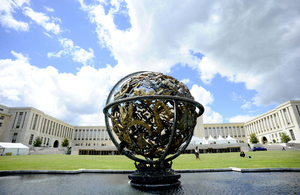Economic Commission for Europe 67: Strengthening Cross-Sectoral Action in Support of the Implementation of the Agenda 2030
This statement was delivered by the UK at the 67th session of the Economic Commission for Europe on 26 April 2017.

The UN Economic Commission for Europe (UNECE) is based at the Palais des Nations in Geneva.
I would like to align myself with the statement made on behalf of the EU and its Member States made earlier today. We too would wish the UNECE a Happy 70th Birthday.
As this is the first time the UK is taking the floor, I would like to thank the Executive Secretary, Christian Friis-Bach for all his hard work over the past three years and wish him all the best for his future endeavours.
The world has undergone enormous change in recent years, and is facing numerous interrelated global challenges. The challenges are of such magnitude and complexity that they demand global political commitment as well as coordinated and coherent action by all countries in cooperation with the wider international community.
The UK is committed to delivering the Sustainable Development Goals (SDGs) at home and around the world. We believe that the ‘Leave no-one behind’ principle is vital to addressing the challenges faced by the UNECE region such as social inequality, promoting gender equality and tackling slow economic growth.
The UNECE has an important role in helping to achieve this, both in the region and globally, as a results-driven organisation which produces best practices, standards and services a number of wide-ranging agreements and conventions.
The SDGs are universal, meaning that everyone has a part to play in delivering them, including: the public, civil society, private sector and state institutions. Civil society has a vital role to play with regard to both contributing to delivery of the SDGs to ensure no one is left behind.
The UK has embedded the SDGs across all of its government work and is working with civil society and all sectors to deliver them.
We have heard here today that partnerships are key – and we would agree with that sentiment. No one organisation can do everything nor should they. The UNECE must focus on its areas of strength where it can add real value.
I would like to reiterate something of importance to the UK and which was raised a number of times yesterday during the Regional Forum on Sustainable Development, many of the SDG targets can only be reached through the prioritisation of girls and women, this should be taken into account in the work and partnerships of UNECE.
Enabling girls and women to live free from violence and exploitation, and prioritising girls and women in UK development spend will help to ensure that Agenda 2030 is achieved.
In her speech yesterday, the UN Deputy Secretary General Amina Mohamed spoke of the need for strengthened leadership at all levels of the UN, more accountability and focusing on results. We remain supportive of the UNECE’s commitment to working within its mandate as well as the continued improvement of its management and administrative structures which the Executive Secretary has championed.
Making further improvements in these corporate areas would enhance the UNECE’s capacity to have an impact on the daily lives of those living in the region. We stand ready to support and work closely with the UNECE on this.